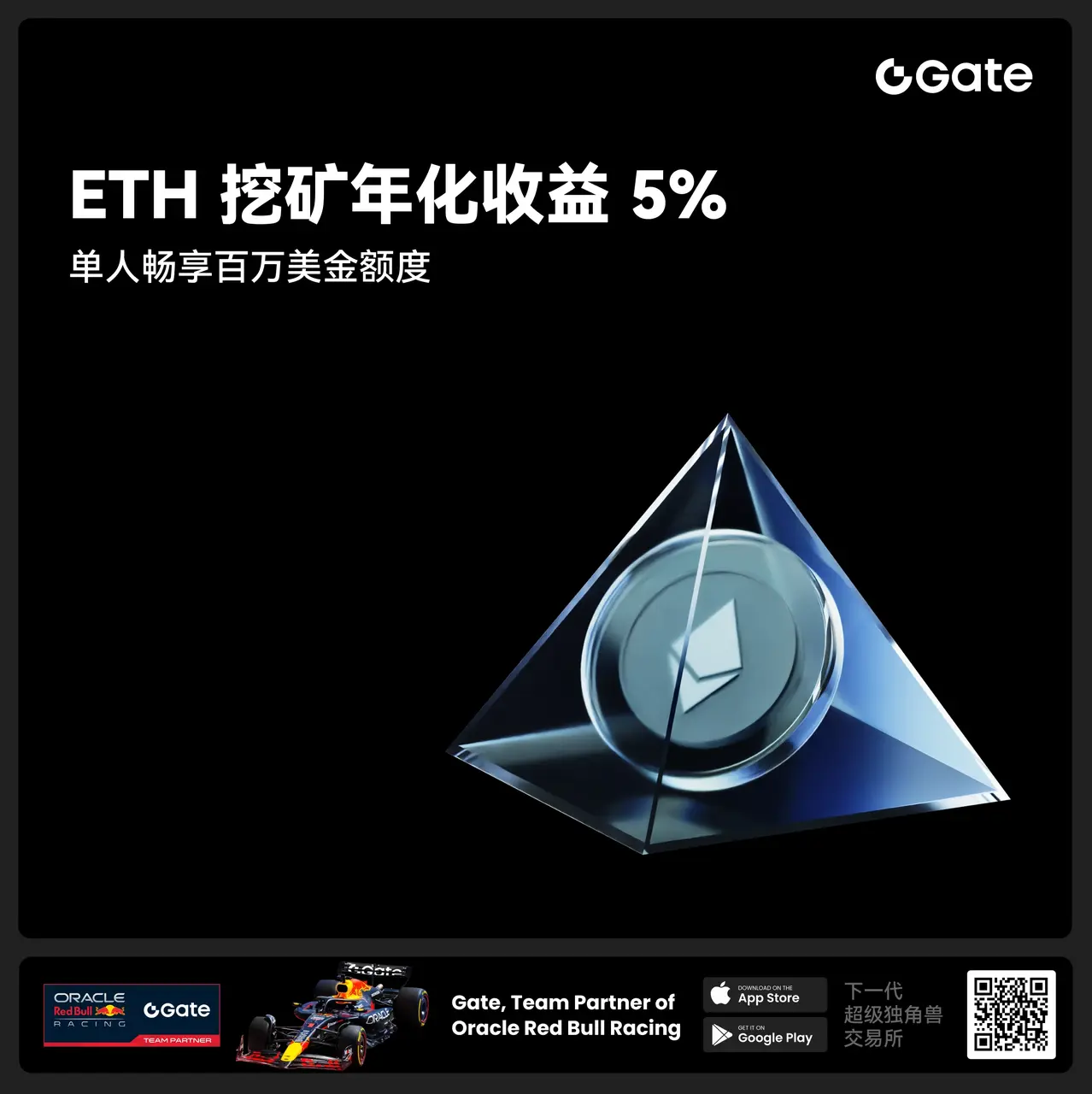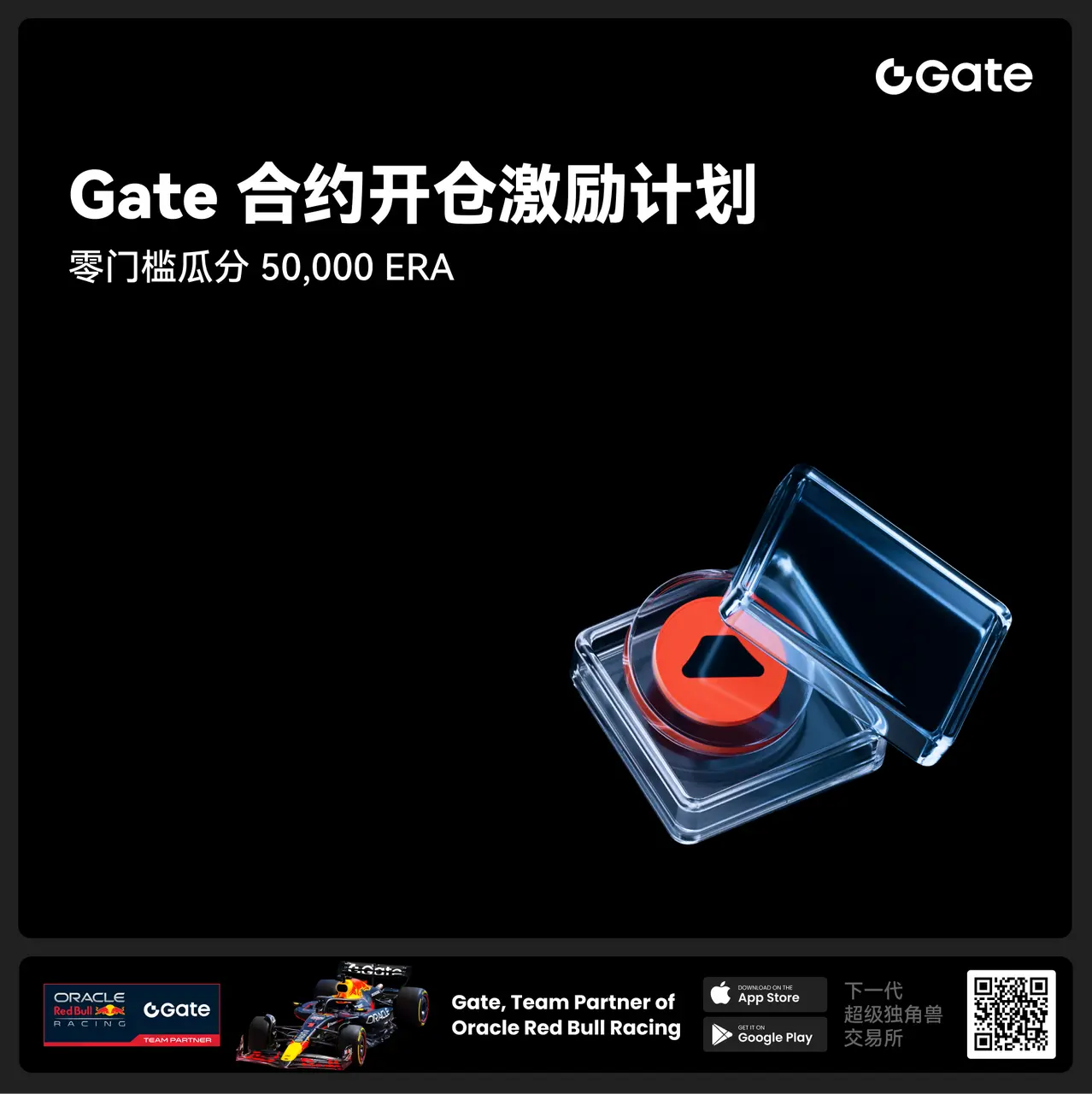- 話題1/3
15k 熱度
34k 熱度
18k 熱度
6k 熱度
172k 熱度
- 置頂
- Gate 鏈上賺幣:ETH 挖礦限時高收益!
✅ 年化收益近 5% + 額外獎勵單人額度 1000 ETH
💎 最低 0.00000001 ETH 起投,無贖回期,隨存隨取!
立即上車,穩賺鏈上收益:https://www.gate.com/staking/ETH
- Gate 合約開倉激勵計劃火熱上線!零門檻瓜分 50,000 ERA
開倉即有獎,交易越多獎勵越多!
新用戶享 20% 加成!
立即參與:https://www.gate.com/campaigns/1692?pid=X&ch=NGhnNGTf
活動詳情:https://www.gate.com/announcements/article/46429
#Gate # #合约交易 # #ERA#
- 👀 家人們,最近你們都攢了多少 Alpha 積分啦?
空投領到了沒?沒搶到也別急,廣場給你整點額外福利!
🎁 曬出你的 Alpha 收益,咱們就送你$200U代幣盲盒獎勵!
🥇 積分最高曬圖用戶 1 名 → $100 代幣盲盒
✨ 積分榜前五優質分享者 5 名 → 各得 $20 代幣盲盒
📍【怎麼玩】
1️⃣ 帶上話題 #晒出我的Alpha积分收益# 發廣場貼
2️⃣ 曬 Alpha 積分截圖 + 一句話總結:“我靠 Gate Alpha 賺了 ____,真的香!”
👉 還可以分享你的攢分技巧、兌換經驗、積分玩法,越乾貨越容易中獎!
📆【活動時間】
8月4日 18:00 - 8月10日 24:00 (UTC+8)
- 🎉 #CandyDrop合约挑战# 正式開啓!參與即可瓜分 6 BTC 豪華獎池!
📢 在 Gate 廣場帶話題發布你的合約體驗
🎁 優質貼文用戶瓜分$500 合約體驗金券,20位名額等你上榜!
📅 活動時間:2025 年 8 月 1 日 15:00 - 8 月 15 日 19:00 (UTC+8)
👉 活動連結:https://www.gate.com/candy-drop/detail/BTC-98
敢合約,敢盈利
- 🎉 攢成長值,抽華爲Mate三折疊!廣場第 1️⃣ 2️⃣ 期夏季成長值抽獎大狂歡開啓!
總獎池超 $10,000+,華爲Mate三折疊手機、F1紅牛賽車模型、Gate限量週邊、熱門代幣等你來抽!
立即抽獎 👉 https://www.gate.com/activities/pointprize?now_period=12
如何快速賺成長值?
1️⃣ 進入【廣場】,點擊頭像旁標識進入【社區中心】
2️⃣ 完成發帖、評論、點讚、發言等日常任務,成長值拿不停
100%有獎,抽到賺到,大獎等你抱走,趕緊試試手氣!
截止於 8月9日 24:00 (UTC+8)
詳情: https://www.gate.com/announcements/article/46384
#成长值抽奖12期开启#
‘Time is now’ for US to lead global crypto race, says CCI chief
A crypto lobby group claims that the US is back on track to lead the cryptocurrency industry after the White House’s latest crypto report called for the nation’s finance regulators to align on digital assets.
The report, released last week, marks a possible end to the long-standing turf war between the Securities and Exchange Commission and the Commodity Futures Trading Commission over how to classify and regulate cryptocurrencies.
“We’ve had legal precedent — Bitcoin, Ether and many other digital assets are much more akin to commodities,” said Ji Hun Kim, newly appointed CEO of the advocacy group Crypto Council for Innovation, in an exclusive interview with Cointelegraph.
Kim, who attended the report’s public release at the White House, said “the time is now” for the US to take the lead in the global crypto race. While other jurisdictions have a years-long head start, the US is now in a “crypto sprint,” with both the SEC and CFTC signaling plans to swiftly implement the report’s recommendations.
The SEC under the previous administration faced widespread criticism from the crypto industry for its regulation-by-enforcement approach, filing lawsuits against crypto firms based on existing securities laws. That crackdown was coupled with what came to be known as “Operation Chokepoint 2.0,” a wave of debanking that saw crypto firms lose access to traditional financial services.
“This is another example where the report is so explicit and strong and positive — it clarifies that banks should be allowed to engage in various digital asset activities,” said Kim.
Past uncertainty in the US regulatory environment pushed many crypto companies offshore. Dubai quickly emerged as a top destination, with a dedicated crypto regulator. Singapore and Hong Kong also rose in popularity, offering favorable tax treatment and formal licensing regimes for cryptocurrency exchanges.
But the grass isn’t always greener. Though regulatory clarity is improving globally, industry players are learning that clarity doesn’t always mean crypto-friendly — something the US is increasingly becoming.
Earlier this year, Dubai’s Virtual Asset Regulatory Authority tightened supervision and gave firms 30 days to comply with updated rules. Singapore expelled unlicensed firms exploiting regulatory loopholes by serving only overseas clients. And Hong Kong’s cautious pace in issuing licenses has made it clear that it isn’t welcoming all applicants.
Related: Singapore’s ousted crypto firms may not find shelter elsewhere
This is where crypto enters the heart of a wider geopolitical power struggle. China has been working to supercharge the internationalization of its fiat currency, the renminbi, through its central bank digital currency (CBDC). In contrast, US President Donald Trump signed an executive order in January banning any US government-issued CBDC.
“With GENIUS, you can see a lot of growth and development [in private stablecoins]. I think the primary focus should be on these types of stablecoins,” he added.
Meanwhile, Hong Kong’s stablecoin regime is expected to play a strategic role in China’s CBDC ambitions. Chinese academics argue that Hong Kong’s stablecoin network could allow Beijing’s digital currency to integrate into the global stablecoin ecosystem.
US SEC’s “Project Crypto” and CFTC’s “crypto sprint”
Shortly after the White House’s crypto report was published, the SEC unveiled “Project Crypto,” an initiative aimed at developing formal guidance for digital asset firms and attracting crypto companies back to the US as a response to the White House report
The SEC proposed to streamline licensing by allowing brokerages to operate across various asset classes with a unified license. It also aims to establish a clearer division between securities and commodities.
“It should not be a scarlet letter to be deemed a security,” Atkins said. “Many issuers will prefer the flexibility in product design that the securities laws afford, and investors will benefit from the opportunity to earn distributions, voting rights, and other features typical of securities.”
Related: The lessons learned at Operation Chokepoint 2.0 Congressional hearings
The CFTC, meanwhile, is positioning itself to play a more central role in regulating non-security digital assets. Acting CFTC Chair Caroline Pham said on Aug. 1 that the CFTC will kick off a “crypto sprint” to implement the Presidential Working Group’s crypto recommendations.
That division of labor — with the CFTC regulating spot markets for digital commodities and the SEC focusing on tokenized securities — is at the heart of the CLARITY Act, which Kim described as essential to ending the jurisdictional tug-of-war between the two agencies. While the bill has passed in the House, it still awaits movement in the Senate.
“You’ll see increased collaboration between the two agencies. That’s a theme many people overlook in this report. It was also included in the president’s executive order back in January, which directed the agencies to work together on providing clarity, guidance and rulemaking,” Kim said.
US crypto clarity is not deregulation, CCI says
Bitcoin (BTC) proponents voiced how the White House’s crypto report missed the mark, as it lacked an anticipated update to the Bitcoin reserve
The concern echoes outside the crypto industry as well. A coalition of over 80 organizations representing civil rights and consumer groups opposed the CLARITY Act, claiming it “deregulates” the crypto industry by legitimizing risky businesses.
More recently, Senator Elizabeth Warren, joined by Senators Chris Van Hollen and Ron Wyden, has urged the Office of the Comptroller of the Currency to address potential conflicts of interest stemming from the Trump family’s cryptocurrency ventures.
“I don’t think this is deregulation,” he said. “I think this is saying, ‘Hey, we recognize the unique attributes of digital assets. We want to work with the industry to make sure that we best combat illicit finance, protect consumers and investors and give the industry clear rules of the road.’”
With two of the nation’s top finance watchdogs now largely aligned with the White House, the US appears ready to move past infighting and ambiguity.
Magazine: Ethereum’s roadmap to 10,000 TPS using ZK tech: Dummies’ guide